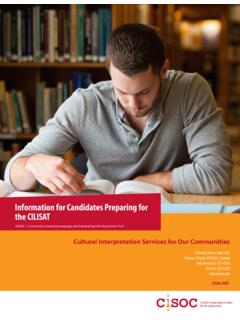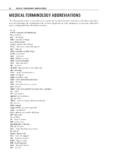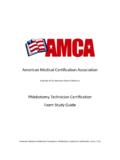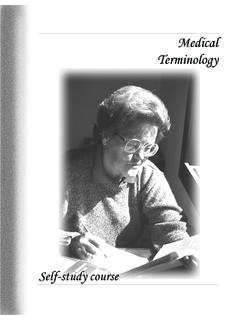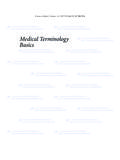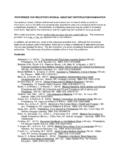Transcription of Guide to the Online Medical Knowledge and Terminology ...
1 Guide to the Online Medical Knowledge and TerminologyCertification TrainingCultural Interpretation Services for Our Communities44 Eccles Street, Suite 100, Ottawa, Ontario K1R 6S4 CanadaTelephone 613-237-0502 fax 613-237-5293 44 Eccles Street, Suite 100, Ottawa, Ontario K1R 6S4 Canada telephone 613-237-0502 fax 613-237-5293 Guide to the Online Medical Knowledge and Terminology Certification Trainingpage 1 Established in 1993, the Cultural Interpretation Services for our Communities (CISOC) is a non-profit, charitable organization that strives to provide the highest quality interpretation and translation services in order to facilitate equitable access to health, legal, social, educational, community and other services to non-English- or non-French-speaking clients. The agency, which offers services in over 60 languages, 24 hours per day, seven days per week (including holidays), is governed by a voluntary board of organization was the result of collaboration amongst several committees and agencies.
2 Since 1993, CISOC has worked successfully as an independent provider of interpretation and translation services to a broad spectrum of organizations and individuals. The agency currently responds to approximately 1,100 calls for interpretation and translation requests each month and is well-respected for its dedication to maintaining excellent service 1994, at the request of Ontario s Ministry of Citizenship, Culture and Recreation, CISOC developed the Community Interpreter Language and Interpreting Skills Assessment Tool (CILISAT). The tool evaluates the language and interpretation proficiencies of people applying for certification as community interpreters in any of 50 high-demand languages. CISOC manages and administers CILISAT certification in these 50 languages throughout Ontario, as well as in two centres in Alberta, two in British Colombia, and one centre each in Qu bec, Manitoba, Nova Scotia and 2009, CISOC started the development of the Online Community Interpreter Certification Program and it was fully launched in June 2010.
3 This program responds to the need for flexibility and accessibility for bilingual and multilingual newcomers and Canadians who wish to pursue careers as community interpreters but who can not certify through regular in-house training to demand, in 2013, CISOC launched its Online Medical Knowledge and Terminology Certification training for those wishing to improve their interpretation skills in the Medical field. It provides learners with extensive training in both the theoretical Knowledge applied in Medical settings, as well as the key terms used during Medical interpretations. The training has since been modified to be applicable to a wide variety of industries, including (but not limited to): interpreters; translators; non- Medical hospital and community health centre staff; Medical insurance providers; and individuals who work as a liaison between Medical professionals and the general S Background44 Eccles Street, Suite 100, Ottawa, Ontario K1R 6S4 Canada telephone 613-237-0502 fax 613-237-5293 Guide to the Online Medical Knowledge and Terminology Certification Trainingpage 2An understanding of Medical Knowledge and Terminology is an important part of the job for many people.
4 For example, Medical interpretation is a complex and demanding part of a community interpreter s work. Interpreters act as a bridge between peoples and cultures, and like a bridge, they require a solid understanding of the technical language used in various settings. For Medical interpreters, that Knowledge requires a thorough understanding of both the theory and language used by Medical Medical Knowledge and Terminology Certification training offers a complete course of study designed to enable interpreters, translators, non- Medical staff, Medical sales staff, etc. to work effectively in Medical or medically-related environments. Through a mix of academic content, quizzes, and audio pronunciation guides, students will learn the Knowledge and language necessary to carry out their jobs effectively and Online Medical Knowledge and Terminology Workbook can be accessed from any computer with an internet connection.
5 The workbook offers students the ability to study at their own pace and plan study sessions around their own schedules. Studying Online requires the same commitment of time and effort as studying in a classroom. Therefore, students are advised to set aside a time to study when they know they will not be disturbed. Being consistent in one s efforts will make it easier to measure progress and ensure that full advantage can be taken of the material provided. Introduction to the Medical Knowledge and Terminology Certification TrainingAbout Online Learning44 Eccles Street, Suite 100, Ottawa, Ontario K1R 6S4 Canada telephone 613-237-0502 fax 613-237-5293 Guide to the Online Medical Knowledge and Terminology Certification Trainingpage 3In order to access the Medical Knowledge and Terminology workbook, students will need internet access (preferably high-speed) and the ability to listen to contents of the workbook, including all printed material, graphics and recorded material, are protected under copyright laws in Canada and other countries.
6 By registering for the Medical Knowledge and Terminology Certification training , you are granted access to view the material Online . All other use is strictly exam voucher is included with the purchased workbook for the final test. Certificates for those who pass the test will be issued in the name of the registered student. The Medical Knowledge and Terminology Workbook is divided into 17 units covering the following topics: Unit One: Medical TerminologyUnit Two: Body SystemsUnit Three: Medical Specialities, Signs and Symptoms of Disease, and DiagnosticUnit Four: Body Fluids, Blood, Lymphatics, and ImmunityUnit Five: The Cardiovascular SystemUnit Six: The Respiratory SystemUnit Seven: The Digestive SystemUnit Eight: The Endocrine SystemUnit Nine: The Integumentary SystemUnit Ten: The Musculoskeletal SystemUnit Eleven: Neurology and Mental HealthUnit Twelve: The Male Reproductive SystemUnit Thirteen: The Female Reproductive SystemUnit Fourteen: The Urinary SystemUnit Fifteen: The Eyes, Ears, and SensesUnit Sixteen: CancerUnit Seventeen.
7 Pediatric MedicineTechnical RequirementsCopyright InformationThe Medical Knowledge and Terminology Workbook44 Eccles Street, Suite 100, Ottawa, Ontario K1R 6S4 Canada telephone 613-237-0502 fax 613-237-5293 Guide to the Online Medical Knowledge and Terminology Certification Trainingpage 4 The workbook provides approximately 186 hours of instructional materials. Students will have access to the workbook for six months (180 days) from the date of purchase. After this time, access codes will no longer be valid. It is essential that students are able to meet the time commitment necessary to complete the course within the noted time limit. CISOC does not track student progress through the workbook. Students are responsible for moni-toring their own progress to ensure they can complete the training on time. Only selected parts are are divided into six parts:1. Unit Introduction: The introduction outlines the section s learning objectives and the key concepts covered in the Printable Word Parts: Each unit contains a list of the word parts that combine to form Medical terms.
8 Even though there is significant repetition among these lists, it is important to print them all. This will assist you in recognizing the terms that are most commonly Unit Sections: The academic material in each unit (except Unit 1) is divided into various sections: anatomy and physiology; common diseases and disorders; and diagnostic tests and treatments. 4. Supplementary Terms: At the end of each unit (except Unit 1) is a list of supplementary terms that provide additional information about the unit s subject matter. 5. Quizzes: Each unit contains a series of quizzes to assist you in monitoring your understanding of the learning material covered. (Note: Quizzes in Unit 1 are embedded throughout the learning material while all quizzes in other units are located at the end of the learning material.)6. Audio-Assisted Pronunciation Guides: It can be difficult to know how to pronounce Medical terms. For this reason, we have provided you with an audio facility (denoted by a speaker icon) to help you learn how to pronounce selected terms.
9 These are distributed throughout the StructureWorkbook Access44 Eccles Street, Suite 100, Ottawa, Ontario K1R 6S4 Canada telephone 613-237-0502 fax 613-237-5293 Guide to the Online Medical Knowledge and Terminology Certification Trainingpage 5 Quizzes are not interactive; therefore, you must use pencil and paper to answer the questions. You can check your answers by opening the Answer windows. It is in the student s best interests to answer each question before opening the Answer window. Treat the quizzes as you would any examination is based solely on the Medical terminologies that are listed in your Word Parts sections. You will be asked to decipher individual word parts; combine word parts to create a Medical terms; and identify the meanings of Medical terms that are formed from combined word parts. If you have questions concerning the content of the workbook or are experiencing technical problems accessing the workbook or any of its sections, support is available at successful interpreter must be fluent in more than one language.
10 The Medical Knowledge and Terminology Workbook does not measure language proficiency and does not teach languages. Its scope is to provide community Medical interpreters with the skills needed to conduct effective Medical suggest that anyone considering completing this training have their language skills assessed through CILISAT or another reputable agency before enrolling. Many universities and colleges offer assessments (for a fee) in select languages. For help locating an evaluation centre near you, please contact The CILISAT is a CISOC-delivered test which measures proficiency in 50 languages. For information about CILISAT, please contact or visit our website at AnswersThe ExaminationSupportLanguage Skills - For Interpreters Only44 Eccles Street, Suite 100, Ottawa, Ontario K1R 6S4 Canada telephone 613-237-0502 fax 613-237-5293 Guide to the Online Medical Knowledge and Terminology Certification Trainingpage 6 Students who have purchased the workbook are able to sit for an Online exam.



